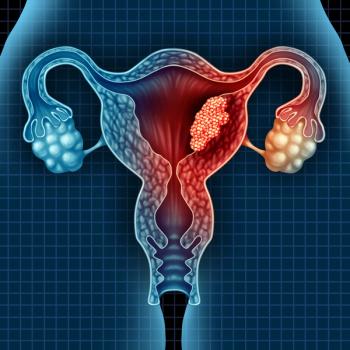
Findings from the phase 2 DOMEC trial showed that although durvalumab plus olaparib was well tolerated, it missed the study’s primary end point of progression-free survival in patients with metastatic or recurrent endometrial cancer.

Your AI-Trained Oncology Knowledge Connection!


Selinexor Yields PFS Improvement in Advanced Endometrial Cancer Vs Placebo

Findings from the phase 2 DOMEC trial showed that although durvalumab plus olaparib was well tolerated, it missed the study’s primary end point of progression-free survival in patients with metastatic or recurrent endometrial cancer.

Patients with endometrial cancer who have low volumetric skeletal muscle measurements had lower 3-year overall and progression-free survival rates.

David M. O’Malley, MD, spoke about where the future of treatment is heading for patients with endometrial cancer.

Investigators believe that molecular classification could be a predictor of survival in patients with recurrent endometrial cancer.

David M. O’Malley, MD, spoke about unmet needs of patients with advanced microsatellite instability–¬high or mismatch repair deficient endometrial carcinoma and the clinical benefit pembrolizumab provides.

David M. O’Malley, MD, spoke about the approval of pembrolizumab for patients with advanced endometrial carcinoma that is microsatellite instability-high or mismatch repair deficient.

Brian Slomovitz, MD, spoke about previously conducted trials that used regimens involving pembrolizumab and chemotherapy for patients with newly diagnosed high-risk endometrial cancer at SGO 2022.

Patients with advanced or metastatic endometrial cancer experienced a significant non-progression rate following treatment with olaparib, metronomic cyclophosphamide, and metformin.

Although patients with endometrial cancer who had histologically confirmed endometriosis/adenomyosis achieved better overall survival than those without, the benefit was linked to stage, grade, age, and histological subtype.

In a poster presentation from Society of Gynecologic Oncology 2022 Annual Meeting, investigators led by Cara Mathews, MD, aimed to determine the benefit of dostarlimab vs standard-of-care doxorubicin for advanced recurrent endometrial cancer.

Cara Mathews, MD, spoke with CancerNetwork® about research examining dostarlimab vs doxorubicin for patients with mismatch repair–deficient endometrial cancers.

Brian Slomovitz, MD, Reviews Adjuvant Pembrolizumab and Chemo +/– Radiotherapy in Endometrial Cancer

Pembrolizumab has been approved by the FDA for the use in advanced microsatellite instability–high/mismatch repair–deficient endometrial cancer following prior systemic therapy.

A survival benefit was observed in patients with advanced or recurrent endometrial cancer who were treated with maintenance selinexor.

The ongoing KEYNOTE-B21 trial aims to determine if pembrolizumab plus adjuvant chemotherapy with or without radiotherapy will improve disease-free survival and overall survival in patients with newly diagnosed endometrial cancer.

Results presented at an ESMO Virtual Plenary in March 2022 show that maintenance therapy with selinexor decreased the risk of progression or death for patients with advanced or recurrent endometrial cancer.

The KEYNOTE-775 trial found that lenvatinib plus pembrolizumab prolonged progression-free survival compared with chemotherapy for patients with endometrial cancer.

Topline findings from the phase 3 SIENDO trial did not appear to likely support a supplemental new drug application use of selinexor in patients with advanced or recurrent TP53 wild-type endometrial cancer, prompting the creation of a new phase 3 trial to support a future submission.

Patients with advanced endometrial cancer derived a more notable survival benefit after being treated with lenvatinib and pembrolizumab compared with chemotherapy alone.

The phase 3 SIENDO trial, examining the use of frontline maintenance selinexor after combination chemotherapy in patients with advanced or recurrent endometrial cancer, met its primary end point of a statistically significant improvement in progression-free survival.

Patients with microsatellite instability–high and mismatch repair–deficient advanced endometrial cancer experienced a long lasting benefit following treatment with pembrolizumab.

Patients with endometrial cancer who were treated with 30 Gy of 6 fractions of vaginal cuff brachytherapy presented with lower toxicity.

Investigators identified a link between high tumor mutational burden and high responses to dostarlimab among patients with endometrial cancer.

Phase 3 results demonstrating the superiority of the pembrolizumab plus lenvatinib combination vs standard chemotherapy served as a confirmatory trial for its approval in certain patients with advanced endometrial cancer.

Based on results from the phase 2 GARNET trial, dostarlimab may be used to treat recurrent or advanced endometrial cancer progressing on or after treatment with a platinum-containing chemotherapy that is mismatch repair deficient.